- Pūrongo ā-Tau 2022-23
- SECTION 1
Our year in review - SECTION 2
Making New Zealand better for New Zealanders - SECTION 3
A high-performing organisation and a great place to work - SECTION 4
Māori-Crown Relations Capability - SECTION 5
Carbon Neutral Government Programme - SECTION 6
Annual Report of the Ministry for Ethnic Communities - SECTION 7
Digital Executive Board Annual Report 2022/23 - SECTION 8
Financial and non-financial results - SECTION 9
Appendices - SECTION 10
Glossary (Appendix E)
- SECTION 1
Go to the Contents View or download the PDF version Go to the next section
3. He wāhi rawe ki te mahi, ā, he whakahaere e eke ana ki te taumata teitei
A high-performing organisation and a great place to work
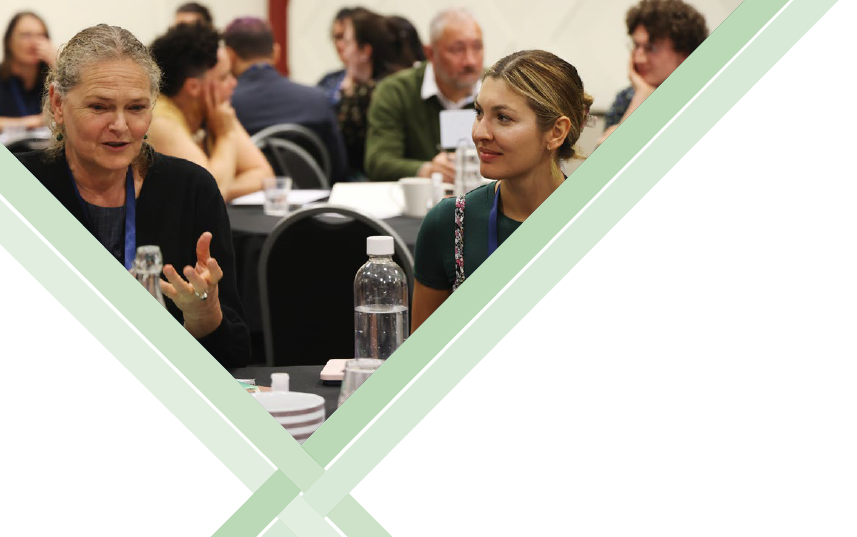
About this section
We continue to build on the strong organisational capabilities that support us to deliver results for New Zealanders and make Te Tari Taiwhenua a great place to work. The people and communities we serve are diverse. In this section we explain how we continued to build our workforce capability in 2022/23 to reflect the communities we serve and put our customers at the centre. This supports Te Tari Taiwhenua to fulfil a ‘spirit of service’ and make New Zealand better for New Zealanders.
Ngā tīpako
Highlights
|
He wāhi rawe ki te mahi, ā, he whakahaere e eke ana ki te taumata teitei
A high-performing organisation and a great place to work
Inclusion and diversity in our workforce
Our vision is to grow and celebrate our people’s mana by being respectful and inclusive in our diversity to effectively deliver our Ā Mātou Mahi strategic outcomes and make a difference for New Zealanders. We want our people to experience an inclusive workplace where they feel supported, connected and empowered to be their authentic selves.
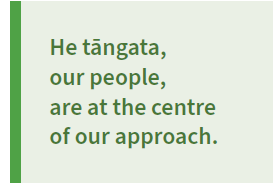 As a long-standing Alliance Partner with Diversity Works, Te Tari Taiwhenua is committed to being a role-model of workplace inclusion and diversity best practice. We aspire to have a workforce that reflects the diversity of the communities we serve.
As a long-standing Alliance Partner with Diversity Works, Te Tari Taiwhenua is committed to being a role-model of workplace inclusion and diversity best practice. We aspire to have a workforce that reflects the diversity of the communities we serve.
Our permanent workforce includes 2,054 employees. Details of our workforce profile are contained in Appendix B.
At Te Tari Taiwhenua, we are diverse by default and inclusive by design. Taura Herenga Waka, our Inclusion & Diversity strategy, reflects the five priority areas of Papa Pounamu – a comprehensive programme of work mandated by Te Kawa Mataaho Public Service Commission and is aligned with our mātāpono.
Below are some examples of how we make the most positive difference for our people across all areas of diversity in these commitment areas.
Addressing bias and discrimination
Addressing bias is critical to ensuring all kaimahi are provided with opportunities at all stages of their careers and that they are treated fairly regardless of their disability, religious beliefs, gender identity, age and sexual orientation. Some examples of how we take action to address bias include:
- Celebrating cultural events, such as Matariki, Te Wiki o te Reo Māori and Pasifika Language Weeks, and taking part in activities such as Sweat With Pride, Pink Shirt Day and Sign Language Week.
- Creating a work environment where procedures are fair and enable Te Tari Taiwhenua to attract, retain and develop diverse talent.
- Ensuring we work towards eliminating unconscious bias through face-to-face training, an online e-learning, and resources to support leaders to identify and mitigate unconscious bias in all activities.
- Launching of an external Speak Up line to give kaimahi a confidential channel for discussing workplace concerns and build a culture where our people are confident and feel safe to speak up.
- Launching ‘Above the Line, Below the Line’ interactive workshops to raise awareness of unacceptable behaviour and demonstrate our commitment to our principles, behaviours and mātāpono.
Strengthening cultural competence
At Te Tari Taiwhenua we continue to strengthen cultural competency through a range of programmes:
- Mana Āki, our intercultural competence programme, helps build intercultural awareness and understanding. It is made up of nine modules and all kaimahi are encouraged to complete the modules as part of their induction programme.
- The Mataora Programme is a marae-based initiative designed to enhance our te ao Māori capability. The programme has a unique focus using pūrākau (storytelling) from a te ao Māori perspective and equips our kaimahi to bring te ao Māori ways of working and thinking to their mahi.
- Te Aka Matua Māori Leadership Programme offers a pathway of learning for kaimahi Māori ready to take the next step in their career journey: to grow, lead and influence. We are reshaping the programme for a relaunch in 2024/25.
- The Avei’a Pacific Leadership Programme focuses on creating a pathway for public sector leadership development, with the goal of increasing Pacific representation in tier 1 to 3 roles.
We also have a range of courses and programmes aimed at lifting cultural capability in te reo Māori, waiata, tikanga and Te Titiri o Waitangi.
Celebrating and participating in Language Weeks and cultural events is an important step in accepting and celebrating different cultures. At Te Tari Taiwhenua, we hold events and activities throughout the year to celebrate Pacific and Māori Language Weeks and Matariki.
In June 2023, we held regional Māori hui in Auckland and Wellington, to connect our kaimahi Māori and build whanaungatanga, one of our mātāpono. Te Aka Taiwhenua – our Māori strategic framework – was the other focus of the day, progressing toward building an enduring, equitable and positive Māori-Crown partnership. Taha Moana, our Pacific staff network, held an online Ta Moana National Fono (hui, meeting or gathering) where our Pacific peoples had the opportunity to connect, share ideas to strengthen Taha Moana and discuss how they contribute, support and implement Te Ara Vaka – our Pacific strategy.
Supporting our employee-led networks
Te Tari Taiwhenua aims to provide a culture in which all employees can bring their whole selves to work. Kaimahi are encouraged and supported to work together across different areas of Te Tari Taiwhenua. This includes opportunities to participate in social activities and networks such as the Tangata Whenua Network, Taha Moana Pacific Network, Women’s Network, DIAsians and Authentic Self (LGBTQ+).
We continue to provide ongoing support and resources for new and emerging networks, and we hold a number of employee-led events and initiatives each year. During the year, we started building a new disabled employee-led network called Opening Doors.
Building inclusive leadership
Leaders play a critical role in valuing, connecting and empowering our people and creating a culture where kaimahi feel they can bring their whole selves to work. Leaders are crucial to maintain and enhance inclusion and diversity at Te Tari Taiwhenua, so that we reflect the communities we serve.
We are introducing a new leadership development system that will uplift the capability of our leaders and ensure they are equipped to lead inclusively. The programme is in its design phase and will be launched in the first half of 2023/24. It consists of a range of management and leadership programmes that our leaders will be required to complete. Leading inclusively will be a key focus of the programmes.
Providing equal employment opportunities for everyone
Te Tari Taiwhenua is committed to ensuring all kaimahi are able to achieve their full potential, by fostering a work environment that is free from all gender-based inequalities.
In 2022, we worked with the Public Services Association (PSA) to develop Kia Toipoto – Closing Gender, Māori, Pacific, and Ethnic Pay Gaps Action Plan 2023–2024, setting out our commitment to reduce gender and ethnic pay gaps. This plan includes a first-time analysis of our ethnic pay gaps. The gender pay gap reduced by 1.2 percent and it was 7.3 percent as at 30 June 2023.
We also continued to educate our people leaders through recruitment guidelines, a starting salary tool, and improving the recognition and understanding of unconscious bias to ensure our gender and ethnic pay gap reduction initiatives are sustained.
Making our services accessible to all New Zealanders
We are committed to the Accessibility Charter and continue to ensure the work we do and services we provide are accessed by any New Zealander in a way that meets their needs. Our focus to improve accessibility includes creating a Plain Language Hub and appointing a Plain Language Officer, as required under the new Plain Language Act 2022.
Keeping our people healthy, safe and well
Our people remain at the heart of everything we do. We know that by keeping our people healthy and safe to undertake their mahi, they can continue to provide New Zealanders with the support and services they need.
This year we have focused our mahi on redesigning our wellbeing, health and safety systems to ensure they align with best practice, and with what our people expect and need. This includes:
- Developing a new online reporting tool, named Rourou, to simplify the process of reporting incidents and hazards for kaimahi. This will offer greater transparency to our people leaders so they can proactively manage areas of risk.
- Developing health and safety critical risk registers to allow all kaimahi to have visibility and management of these risks across Te Tari Taiwhenua.
- Consulting with our Māori and Pasifika kaimahi networks to understand their perspectives, which will help us improve accessibility and engagement with wellbeing, and health and safety processes and practices.
- Continuing investment in training and resources to help our Health and Safety Representatives support our people leaders to manage the wellbeing, health and safety risks of their people.
- Training for all people leaders to help them create great working environments for kaimahi, introducing courses on ‘Managing Hazards and Risks’ and ‘Leadership in Safety’.
- Conducting quarterly hazard inspections across all our workplaces.
- Improving quarterly reporting to our Executive Leadership Team to ensure they are being provided with information that supports good decision-making.
Providing safe and secure workspaces for our people and the public
Te Tari Taiwhenua has 17 locations nationwide and two overseas – Sydney and London. Our focus is on providing safe, secure and quality workspaces for our people and the public, and to reduce the risk of damage or loss of taonga. We ensure our buildings are compliant with legislative, health and safety, and regulatory requirements.
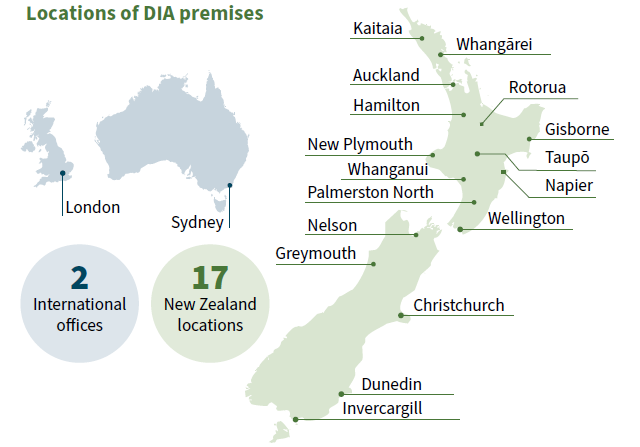
The Property Capital Forward Works Programme is a five-year programme (2020–25) to support these goals and reduce our energy consumption, costs and carbon footprint, while also improving our working environment. During the year, we:
- reviewed Detailed Seismic Assessment recommendations for sites to ensure they are safe and resilient during earthquakes
- carried out a seismic uplift for our Archives building in Wellington
- completed electrical upgrades to prevent electrical failure and to protect taonga that need temperature-controlled environments
- upgraded furniture, fittings and other equipment to ensure a safe, comfortable and consistent design across our workplaces
- upgraded to LED lighting at our various Archives sites and the National Library in Wellington, resulting in 361,000 kilowatt-hour (kWh) savings a year
- began work to replace the cooling towers at the National Library with a more energy efficient option.
Ensuring our people have what they need to work effectively
We continued to provide kaimahi with systems, platforms and devices that are simple and seamless to use. This helps us to manage our resources, improve our capabilities and support our people to deliver our strategic outcomes. We aim to ensure that Te Tari Taiwhenua is a great place to work and all kaimahi have the tools they need to work effectively, whether they are at one of our many locations or working remotely.
During the year, we:
- Rolled out Microsoft Windows 11 to increase resilience across different locations and for our hybrid workforce. For those working on-site, we have introduced new secure wifi networks.
- Continued to embed, monitor and update information security measures to ensure that our systems and the information they hold are protected and secure.
- Enhanced the existing features of Rehutai, our financial system, updating planning, budgeting, project reporting, transactional processing and the ability to interact with data from other systems. This has improved our accuracy and timeliness in forecasting and budgeting and has led to better project monitoring and decision-making.
- Worked with Te Puni Kōkiri to identify and update our supplier system data for Māori-owned businesses. We continue to encourage e-invoicing with our suppliers to assist with the timeliness of payments to them.
- Extended the functionality of Rehutai to support human resource and recruitment management and replaced our payroll system. This enables more self-service functionality and provides clearer oversight for managing time and attendance throughout Te Tari Taiwhenua.
Improving our tools, culture and practices for managing and protecting information
Te Tari Taiwhenua is committed to developing and maintaining information management practices that support our daily activities and enable us to meet our business needs.
During the year, we were audited under the Public Records Act 2005, which has provided us with several areas to focus on over the next five years. This includes disposing of information we are no longer required to keep, applying a records management tool to our enterprise content management system, and identifying what information held by Te Tari Taiwhenua is of importance to Māori.
We place privacy at the core of how we work and take care to ensure the personal information we hold is treated in a knowledgeable and respectful manner. We have a privileged and trusted role as the guardian of identity information, including passports, births, deaths and marriages, and citizenship information. We also collect a diverse range of other personal information to fulfil the wide range of functions we are responsible for.
We developed a multi-year privacy programme, which aims to improve our overall privacy maturity and embed a privacy-aware culture. This programme includes a policy review, as well as building a more complete and evidence-based reporting framework to better guide decisions in this space. This work will begin in 2023/24.
Our investment and asset performance
Te Tari Taiwhenua manages its assets effectively by monitoring key asset performance indicators. This ensures our property assets are cost-effective, well maintained and code compliant. These indicators also help to highlight the assets that need to be replaced and areas that need to be improved.
This year, we focused on developing a delivery plan for areas of concern, ensuring our property assets meet required standards for asset condition, to reduce the risk of asset and infrastructure failure.
Despite adverse weather events and continuous supply and market inflationary challenges, we are in a good position to continue to deliver great outcomes for our customers and kaimahi. Our technology assets play a critical role in enabling kaimahi to work efficiently and ensure that Te Tari Taiwhenua is a modern and responsive public service.
Our ICT asset performance measures provide information on how our internal and customer-facing systems are performing. We monitor and report on the condition, use and functionality of our key assets.
The average service time that our ICT systems were available remains steady this year, reflecting ongoing investments in our core assets. Asset condition performance has returned to target levels as we are no longer impacted by resourcing challenges from COVID-19. While our functionality measure has met the performance target, our asset utilisation performance continues to reflect that Te Tari Taiwhenua is part-way through a managed cycle to renew our fleet of laptops.
Asset condition performance is detailed in Appendix C.
Our first Long-term Insights Briefing released in November 2022
To support more effective long-term planning across the public sector, chief executives of public agencies are required to publish a Long-term Insights Briefing at least once every three years.
Our first Long-term Insights Briefing was published in November 2022, following its presentation in Parliament.
We asked communities and groups what they need and based the following topic on what we heard:
How can community participation and decision-making be better enabled by technology?
We consulted over 150 organisations including those representing the disabled, faith-based associations, Māori, Pasifika, older people, young people, gender minorities, local community networks, charities and others. To respond to this requires not just the public sector, but the private sector and communities, to all work together.
Following its publication, the Economic Development, Science and Innovation Select Committee examined the Briefing. The Committee published its report on our Briefing in April 2023.
How the topic relates to the responsibilities of Te Tari Taiwhenua
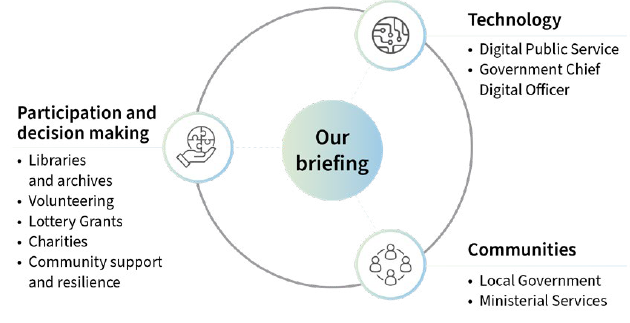
Tō mātou kaihautūtanga me te kāwana
Our leadership and governance
The Executive Leadership Team of Te Tari Taiwhenua includes the Secretary for Internal Affairs, seven Deputy Chief Executives and the Director of the Office of the Chief Executive. The Executive Leadership Team ensures the focus of our efforts and resources, and our operating model, supports our strategic governance role.
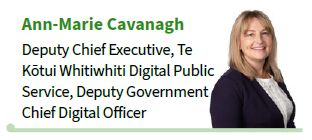
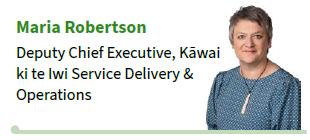
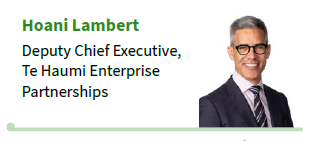
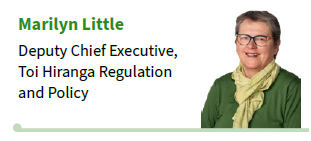
1. Amy Allison was Deputy Chief Executive, Te Urungi Organisational Strategy and Performance until
April 2023.
2. Clare Toufexis was Acting Deputy Chief Executive, He Pou Aronui Organisational Capability & Services until February 2023
Our governance
Our governance system ensures Te Tari Taiwhenua delivers on its purpose, strategic priorities and focus on stewardship, through sound and sustainable long-term decision-making.
Our governance is collectively led by the Executive Leadership Team and supported by three governance sub-committees with well-established governance principles and protocols. This includes clear and understood terms of reference and a comprehensive declarations of interest process.
Our three governance sub-committees support the Executive Leadership Team:
- Finance and Performance Governance Sub-Committee: provides assurance that Te Tari Taiwhenua has the capabilities required to deliver on its strategy and maintain stewardship over its financial sustainability and organisational performance under the Public Finance Act 1989.
- Risk and Assurance Governance Sub-Committee: provides assurance that Te Tari Taiwhenua has an effective risk and assurance system, culture and practice that serves to keep our people and their work safe. The Committee achieves this through oversight of our risk management, audit and assurance (both internal and external) systems.
- Investment Governance Sub-Committee: provides direction on and oversight of our investment system health and portfolio management, reviewing and approving or endorsing to the Executive Leadership Team (in line with its delegated authority) project and programme business cases and investment-related matters.
Te Tari Taiwhenua also has an External Advisory Committee that provides independent advice to the Secretary for Internal Affairs and the Executive Leadership Team in discharging its management and governance responsibilities. This includes guidance on our strategic direction, systems of governance, risk and assurance and organisational performance, as well as the integrity of our performance information.
Risk and assurance
Risk and assurance is a key component of effective governance. Good assurance supports governance bodies in their decision-making, provides evidence of how well business risks are being managed, whether opportunities are being taken, and how well the business is performing. Good risk management practice helps identify key risks to delivery and enables early intervention before risks start to have an impact on outcomes. Applying more consistent risk and assurance advice and support over our priority and/or higher-risk projects and programmes is helping to further embed good risk management practices as integral to our mahi, and ensure we are focused on the right things. Our Assurance Policy and Framework supports an integrated view of assurance across Te Tari Taiwhenua.

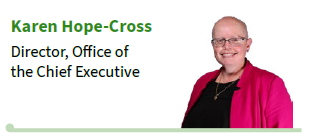
![Karen Vercoe Deputy Chief Executive, Te Urungi Māori Strategy and Performance [1] Karen Vercoe Deputy Chief Executive, Te Urungi Māori Strategy and Performance [1]](vwluResources/AR-ELT-row-1-Karen-2/$file/AR-ELT-row-1-Karen-2.png)
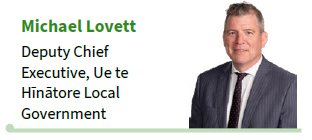
![Darrin Sykes Deputy Chief Executive, He Pou Aronui Organisational Capability & Services [2] Darrin Sykes Deputy Chief Executive, He Pou Aronui Organisational Capability & Services [2]](vwluResources/AR-ELT-row-4-Darrin/$file/AR-ELT-row-4-Darrin.png)